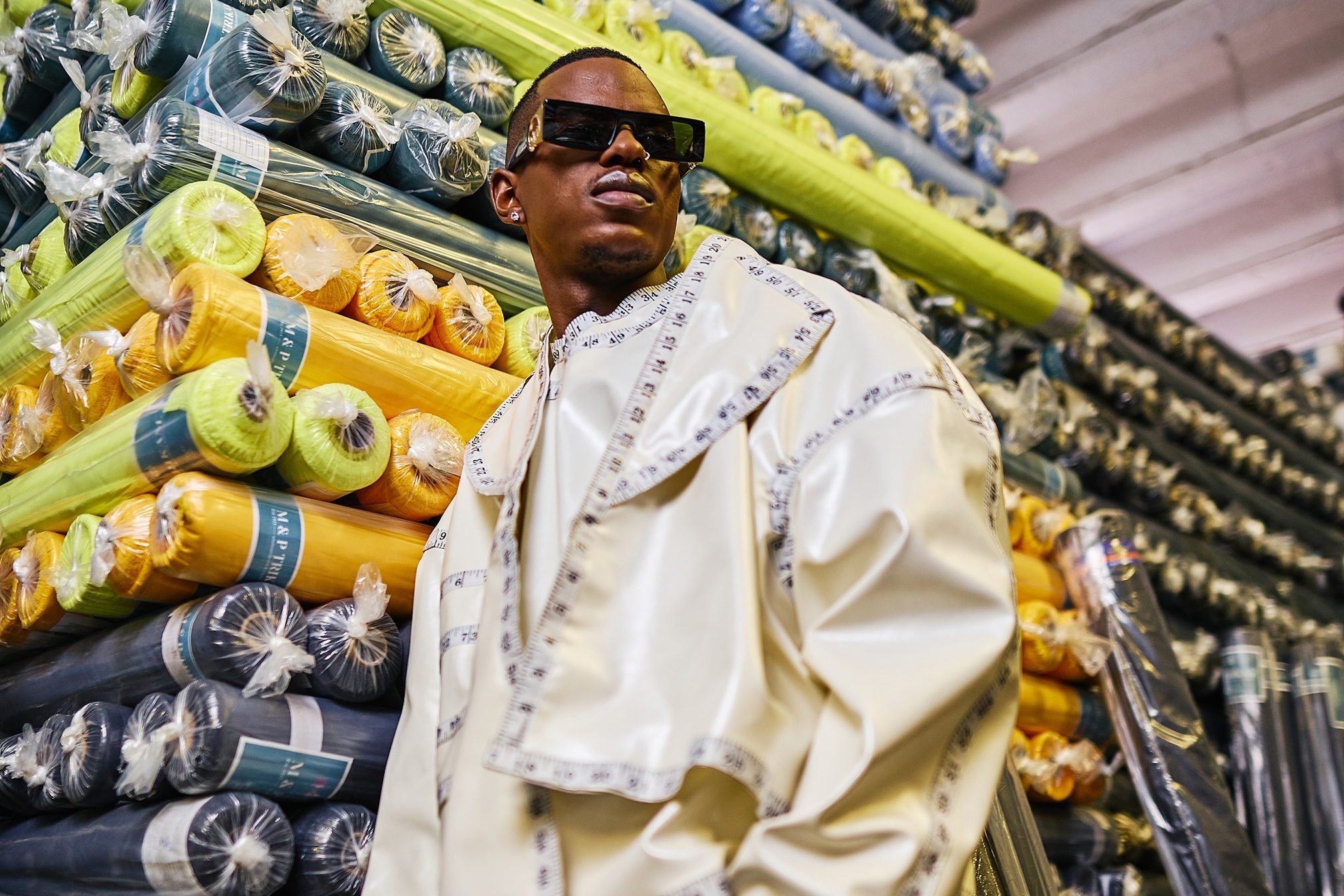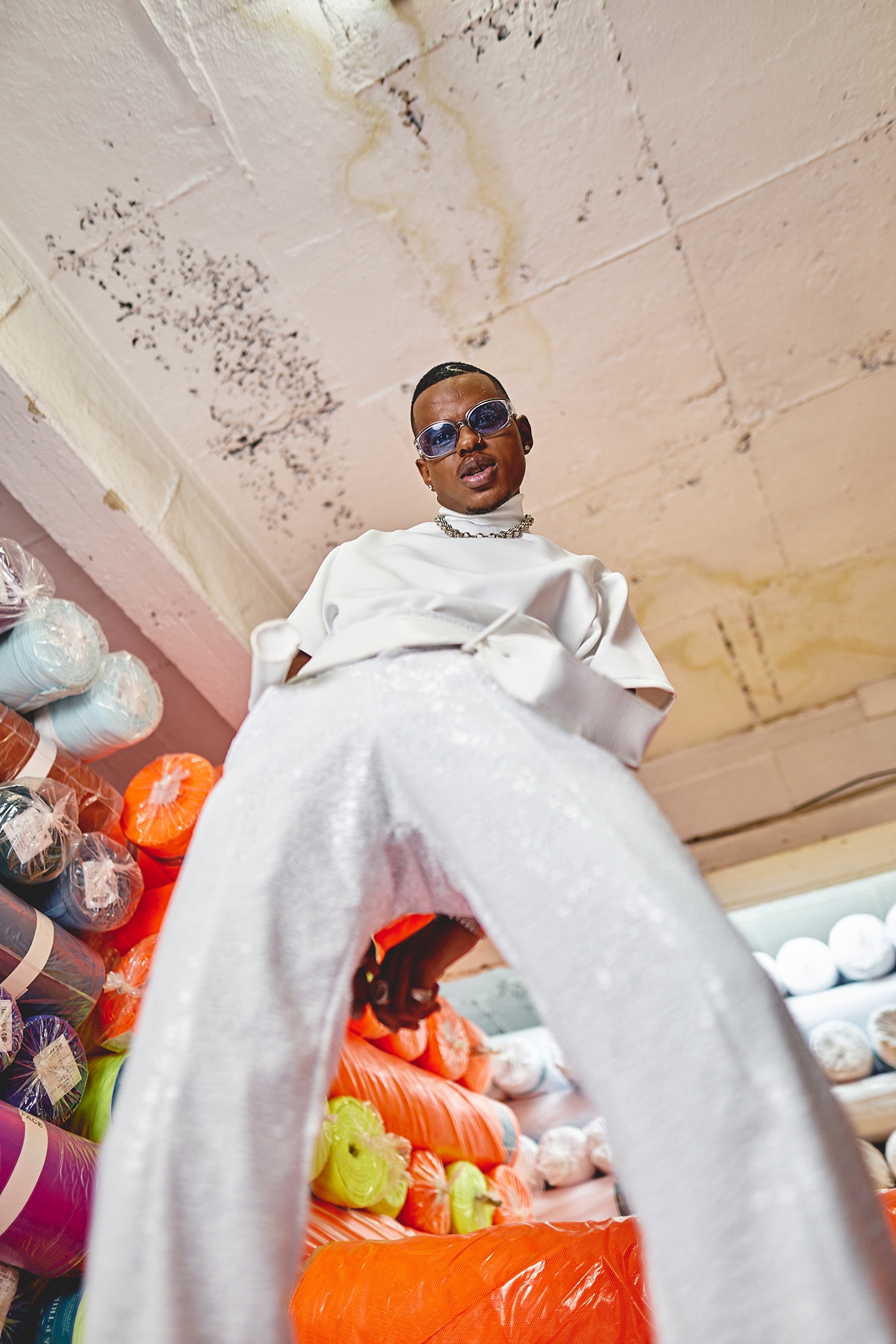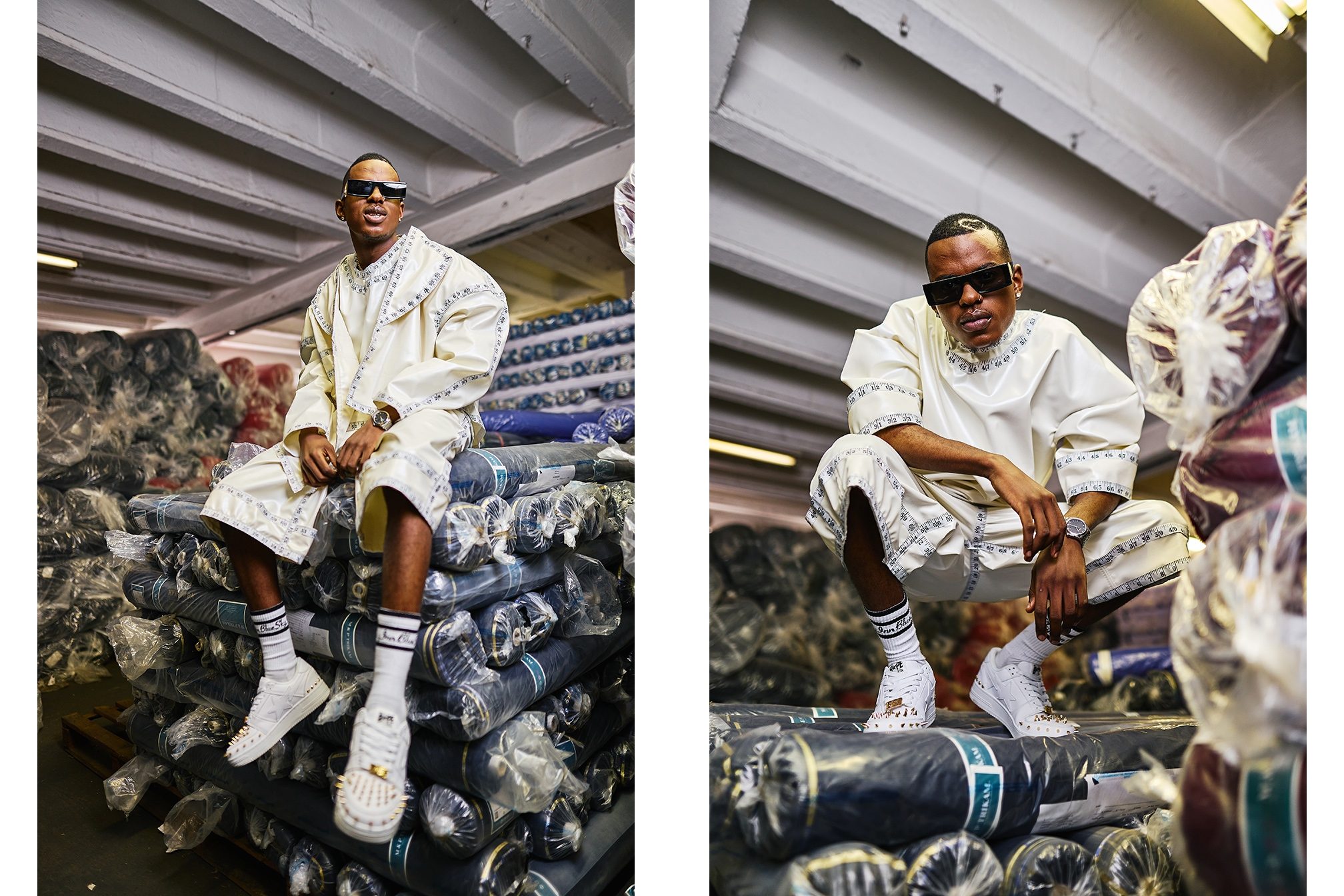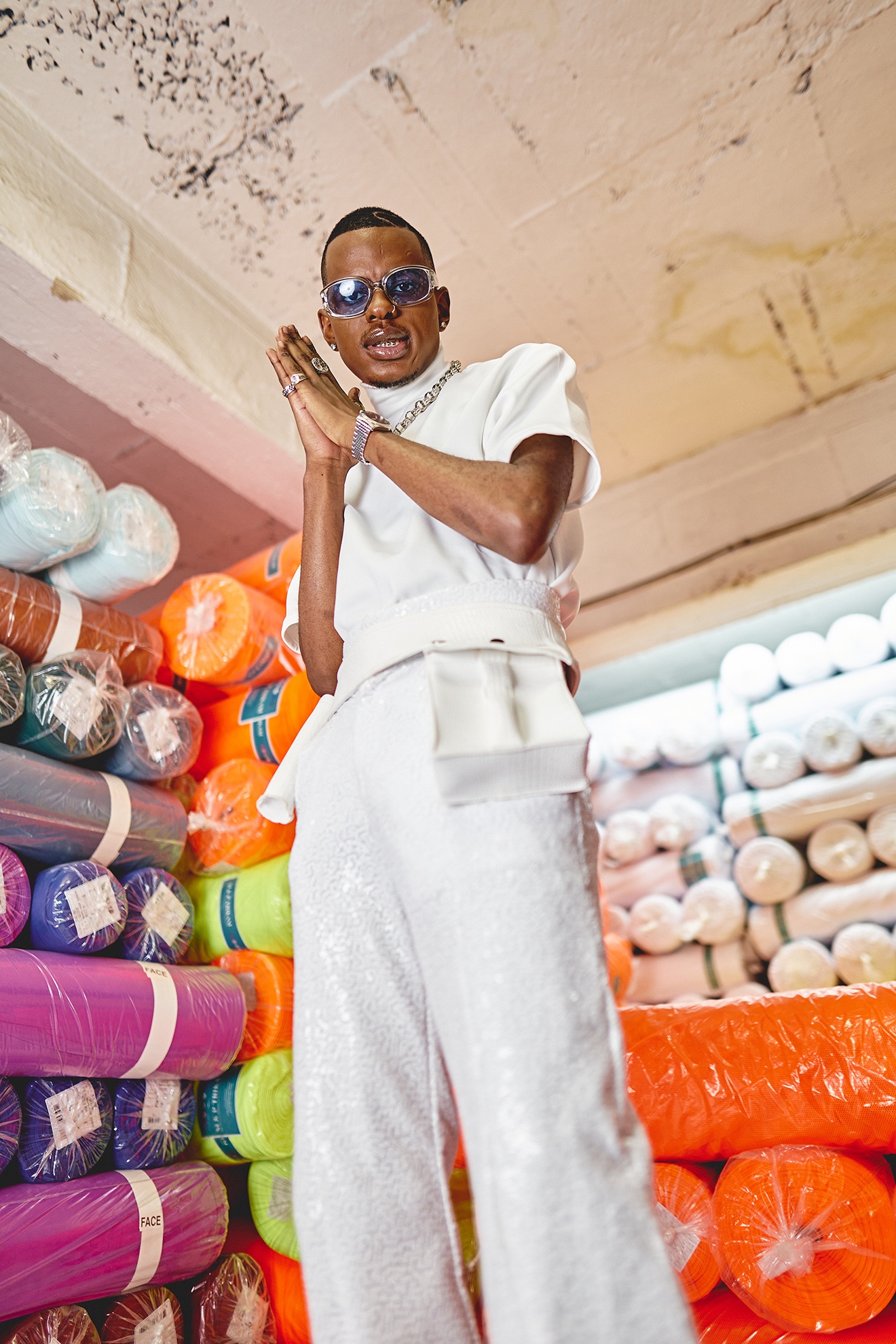 Features
Features
Amapiano powerhouse: The irresistible charm of Musa Keys
Madzadza Miya speaks to triple threat amapiano star Musa Keys about inspiring new evolutions in amapiano, fashion and the importance of being independent
In the highly competitive amapiano scene, the multi-faceted, trailblazing, and fashionable Johannesburg-based Musa Keys possesses talent and star quality that makes him stand out.
The artist born Musa Appreciate Makamu in Giyani and raised in Polokwane, Limpopo, is a triple threat: he produces, DJs, and sings. His live performances are a marriage of these art forms and are usually broken up into two parts. He plays an electrifying DJ set before seamlessly switching to render a mesmerising, auto-tune-delivered vocal display. His artistic showcases are the making of a superstar and can convert any detractor into a believer.
Like many musicians of the past and the future, Musa’s music journey begins in the church, where he took up the role of a pianist. “Church highly influenced the way I approach my music,” Musa reveals during a band rehearsal for an upcoming live performance. “I'm a [all-around] musician before being an amapiano artist so I’m technical about everything, because I understand the importance of having a solid team, in terms of the band, and the importance of having different sounds playing on a song. How to put a song together and how to arrange it — that comes from the church.“
After a short stint of doing covers on YouTube, being a part of numerous bands, and dabbling in other genres, Musa’s first commercial foray into amapiano was on Caltonic SA’s 2019 track 'Heat Overload'. However, his first solo standout moment would come a year later when he unleashed the hypnotizing 'Samaritan Boy'. At the time of its release, the song’s mumbling and wordless chant vocals were unique, and songs like that were few and far in between within the amapiano space. He would further usher this style, with the assistance of Nobantu Vilakazi on his smash hit 'Vula Mlomo'—which recently walked away with the prestigious and highly-contested Record Of The Year trophy at the 28th annual South African Music Awards (SAMAs).
Towards the tail end of 2021, Musa released his debut album 'TAYO', which translates to “source of joy” in Yoruba. The opener 'Selema (Po Po)' has since gone on to be a standout and has received the remix treatment from Nigerian singer Victony. In between continental and international tours, the self-professed ‘Tsonga Michael Jackson’ has scooped up a GQ Best Dressed Celebrity award and got nominated for an MTV EMA and an AFRIMMA (African Muzik Magazine Award). Through his TAYO Projects record/management label, Musa has also been nurturing and providing a platform to emerging talent. Towards the end of last year, the camp—consisting of Konke, Chley, Leandra.Vert, Toby Franco, Optimist Music ZA, alongside Musa—put out a six-track compilation titled 'House Of TAYO'.
We caught up with the superstar to talk about his recent music, 'Selema (Po Po) [Remix]', fashion, touring, his label, and more.

How have you managed to set yourself apart from everyone else in the music scene, especially within amapiano which is known to have many players?
I think, in this day and time, it’s no longer that hard to break into the amapiano scene, but staying and consistently being relevant is the hardest part. Right now it’s as easy as finding a popular guy and making music for them, ‘cause some of them don’t produce the music themselves. As a producer, you could just simply find one [established act], and the truth is we are all looking for people to help us build. But I produce my own music, I sing on my own music, I mix and master my own music, and I’m an all-around musician. I am a powerhouse. I can do it all by myself.
I also believe in fashion so much. I feel like fashion is ever-lasting. It doesn't have boundaries. It doesn't have seasons that run out and people never go back to it. As much as it’s the summer season right now [in South Africa], there’s going to be winter [again]. The clothes you were wearing last week you can wear again next year in winter, unlike music. Music is different, music on its own can get old. Music can stay there for two years and people might still not like it two years later. However, the clothes will still be relevant. So I felt like let me use something that I really like, which is clothes, something to stay relevant with. Besides that, I’m never about controversy. I always stay away from controversial stuff.
Congratulations on winning Song Of The Year at the SAMAs. Awards in general have sort of lost their value over the years, globally. What does that sort of recognition mean to you and how did winning the award make you feel?
You know 'til today I still haven’t understood how big the award is, the people around me keep telling me that this is a big deal. I think maybe my dreams are too high. My goal right now is to be nominated for the GRAMMYs, that’s where my head space is, being constantly nominated for the BETs, and all these big international awards. Not that I'm neglecting the ones at home, but for me, that’s just where my mind is at. But I also know that there’s no way I can collect a GRAMMY if I haven’t collected something at home. For me, I’m taking everything day by day. I have my superstar button off maybe 80% of the time. 20% is when I’m on stage or when I’m out in public. But besides that, my superstar button is always off. I’m very down-to-earth about stuff.
Read this next: Scorpion Kings: "Amapiano hasn't even reached its full potential"
From your melodic mumbles on 'Samarian Boy' to Nobantu’s scatting chant on 'Vula Mlomo', your breakout songs have inspired a whole wave within ‘piano, with many tracks and artists now adopting the style. What inspired you to start doing the mumbling style of singing that you’re now known for?
Initially, I was tryna teach myself how to write. I found it super difficult to write right from the beginning, like creating a flow from the get-go. So I was like, you know what let me just mumble around, create flows first and then re-record. Just record mumbles and stuff, off vibes, then whatever I like, place it together and then change those things to words. So when I was making 'Samarian Boy' that’s what was happening. That was also my first time singing that high, I had never sung that high before. Normally, I would just [sing on a low register]. I never believed that my voice could do that.
I think with 'Vula Mlomo' I understood it before I could even drop it. What happened with the “kurukutjis” [the chants], I understood this could make sense because my fans understand my language, which is mumbling. I have so many hit songs that don’t say anything or people don’t understand. On 'Possible', the “saba labala…”, people don’t know what that means but it’s something dope, something they sing along to. 'Selema (Po Po)', people don’t know what it means but 'til today they like it so much. I think for me I’ve just firmly believed so much in being able to translate music without language. Basically, I’m trying to kill the language barrier, regardless of the language I need the music to make sense to you.
You interestingly have a Nigerian-esque cadence and vocal style on your 'Widlysm' EP and on songs like 'Katara' and 'Big Choppa'. Where does that stem from?
I think that's just my sauce, man. I feel like I can’t dispute the artist in me that’s tryna be vocal in a very groovy way. I hadn’t religiously listened to Nigerian songs by then, but I was already like I like this vibe. I like songs that make you feel like you grooving. Even if it’s a smooth song I want you to feel like ‘damn, this thing is so dope’. So I was like let me just do that, and I started listening to Nigerian music, trying to understand them as well.
But nonetheless, for me to also go in that direction, I feel like Afrobeats is a universal sound created by [West] Africans. It translates to everybody, whether you are white or Black, you are from the States, you are from South Africa, you are from China, it translates. It’s such a unique universal language. As I said, I love my music being universal. Regardless of whether you are an emotional or happy person, I need you to at least have a feeling toward my songs.

How has your sound and musical approach evolved since then? Because you are barely on vocals on 'TAYO', and recent songs like 'Kancane' and 'Mnike'.
I think I had been listening to a lot of [amapiano] albums and I was like: it sometimes gets boring hearing the same person eight times, seven minutes each. So I was like let me rather cut that thing. I’m super big on staying relevant forever so I’m strategic about everything that I do just to make sure I keep the relevancy consistent.
However, I’m also just at a point where I’m like, I can be dope but at the same time, I can make other people dope. I’m one technical person whereby I can hear a good talent and feel like damn, but that pairing was not the one, it’s kind of exhausting the talent. You find that there are some dope artists but they are not making it in the game because of the pairings they make. Music is not only about working with great people, but it’s also about energy, and it’s also about the delivery of everything.
You recently released the remix to your hit record 'Selema (Po Po)' with a guest appearance from Victony. How did that collaboration come about?
I hit up Victony I think around Jan/Feb [2022], I had just recently found out about him on YouTube. He was doing a live performance on Glitch Africa and I was like 'damn this guy is dope'. I sent him a DM and said 'yo bro you sound so crazy' and then he replied saying 'Selema (Po Po)' has been his favourite track the entire December.
When I was on tour in Europe, I told my manager let’s just put money together and go to Nigeria. Instead of flying back home, let’s fly through Naija, for two or three days, make some music and go back home. We went down to Nigeria and did a couple of songs with Victony, but he had already recorded the remix at that time. When we linked up the energy was so clean. He’s a super dope guy so I just thought he was the perfect fit for the song.
Read this next: How Major League DJz are powering the global amapiano movement
In the past year, you’ve embarked on your “Keys to Africa Tour” and “Keys to the World Tour”. Of all the places you’ve played outside of South Africa, which one has been your favourite?
That’s a difficult question because there are certain things I love about specific places, and there are some things I don’t love. In some places, I love the crowd more than the reception of the place, and in some places, I love the environment and reception more than the crowd. They all have had great things about them. But one thing I can say is, I’m starting to become a super great thing in [the rest of] Africa. Which is great to watch cause it’s starting at home. Imagine if I have fans all over Africa. I can say Mozambique is my home now, and Zambia is my home. Kenya, I’m not too sure but I know they like me. Tanzania is definitely home. I have a big following in London. I also have Amsterdam. Australia was crazy. Poland and Portugal were also crazy. Everywhere I’ve gone has been crazy.
Recently, some amapiano acts have been signing to major labels, which hasn’t always been the case. Why have many Amapiano artists chosen to remain independent, and how have you made that work for you with Keys Records and TAYO Projects?
I’m very sceptical of deals because you are basically signing your career away. I’m very hands-on in my career. I wanna know what I’m doing. I don’t want you to have the power to be like ‘you created me’ and then the next thing when I fall I can’t even get back up on my own, because everything was done for me. I wanna know these things. And also, before I start working for white people, let me rather do it myself and see how we manoeuvre so that when I sit down with the people I can then be able to tell them no, I can do that thing on my own. I’m tryna build my brand to a place where I can go back and forth with a big major [record label] and tell them the deal won't go like this, because it’s not like what you’re doing I can’t do it on my own. The reason you even have a conversation with me is that I’m doing great, I’m on your standard.

TAYO Projects has also been developing and helping to introduce and establish artists such as Konke, Chley, and Leandra.Vert. What are some of the plans you have for the label and artists you have under it?
The biggest thing for me is breaking every artist in my camp. Breaking them in, and making sure they are nice, man. Like they living large, they are living soft and making them the superstars that they are. Your hand can reach out to a specific end and you then need an extender, and I happen to be that extender. And I’m gonna need an extender, as well, which is why I also get other people involved in the whole TAYO thing. It’s a beautiful independent empire that I’m tryna build. I’m super big on being independent. I know I’m talking about independence but I’m signing people, but their deals are very independent based. They’re more of management deals, we just do record label things because we tryna get the artists to enjoy themselves and make it worth it for them.
You are also heralded for your fashion choices and how you look, particularly, on stage. What or who inspires your outfits, and how you present yourself, visually?
One thing I’ve noticed is that people get annoyed by seeing the same thing, that’s why I constantly keep changing my style, in terms of music and fashion. I used to wear jackets a lot, I started becoming known for dope jackets. I did it for too long and I saw that the engagement went down. I tried rebranding and the engagement went up again, which is normal as well cause I also get bored of seeing the same thing over and over, sometimes. Be extra and do something crazy. That’s how I’ve managed to maintain my brand growth. I’m constantly seeking growth and new things. I have confidence in everything that I do, I always make sure that as much as some people can bash me, there are people who like what I’m doing. There are some people that are inspired. Some people can be going crazy about me wearing hipster pants, but there are also some people who think I’m such a visionary for doing that.
This interview is lightly edited for length and clarity
Madzadza Miya is a freelance writer, follow him on Twitter


